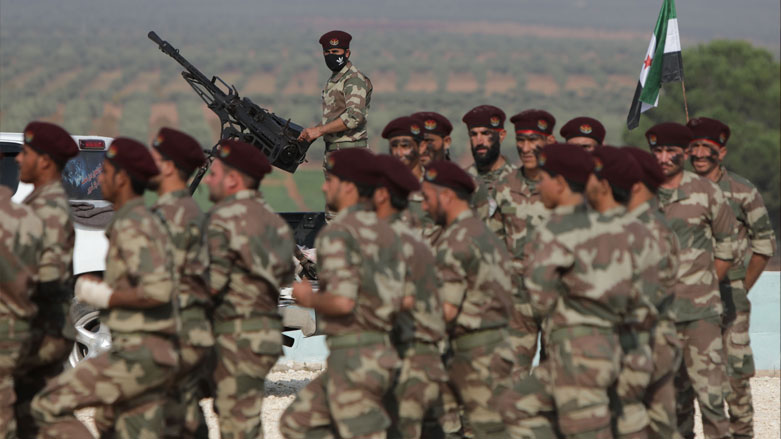Violent clashes erupt in Syria between Turkish-backed groups and Kurdish-led SDF

ERBIL (Kurdistan 24) – The UK-based Syrian Observatory for Human Rights (SOHR) reported that Turkish-backed factions supported by artillery attacked villages on Friday morning in the countryside of northern Syria’s town of Ain Issa.
A report published by the group later that day claimed that fighting continued to take place near the villages of Jahbal and Mushayrifah, located in the eastern countryside of Ain Issa in northern Raqqah.
“Moreover, fierce clashes are still underway between the factions and SDF (Syrian Democratic Forces) since the early hours of Friday morning, amid intensive bombardment and confirmed reports of human losses,” the SOHR said.
So far, read the report, the SDF had resisted the ongoing attacks by Turkish-backed militias.
Earlier, the Turkish-backed group Ahrar al-Sharqiya claimed they had captured both Jahbal and Mushayrifah villages, but the SDF-linked Tal Abyad Military Council has denied this.
Moreover, SOHR said that Turkey and its proxies had brought in military reinforcements to the villages of Abu Kharza, Salloum, and Rummana, opposite al-Hushan and al-Khalidiya villages on Thursday.
The reinforcement comprised tanks, heavy machineguns, personnel carriers, and 4×4 vehicles with submachine gun turrets.
In response, the SDF has reportedly boosted their positions on the opposite side.
After Turkey conducted a cross-border attack into northeastern Syria in October 2019, Russia and the US reached separate ceasefire deals with Ankara, which allowed Turkish troops to control the area between Tal Abyad and Serekaniye.
Although US President Donald Trump initially decided last year to withdraw US forces from northeast Syria following a phone conversation with Turkish President Recep Tayyip Erdogan, he was later convinced to keep troops in the northeast to prevent the oil fields from falling into the hands of Iran or the so-called Islamic State.
As a result, there are still US troops in the Hasakah and Deir al-Zor regions, which contain the majority of Syria’s oil resources, even as the US withdrew from bases surrounding Kobani, Manbij, and Raqqa that were later taken over by the Russian military.
Despite the agreements, Turkish-backed groups and the Turkish army itself continue to target SDF-held areas periodically. In some cases, villagers living in Syrian-Turkish border areas were killed in attacks by the Turkish military and the rebel forces Ankara supports.
On Dec. 10, Ilham Ahmad, President of the Executive Committee of the Syrian Democratic Council (SDC), called on Russia and the US to prevent further Turkish attacks amidst fears of a possible new Turkish operation near Ain Issa.
On the following day, the United State expressed concern about the increase of violence that week near Ain Issa, Tal Tamir, and Ras al-Ain, calling “on all parties to exercise restraint, deescalate the situation, and preserve the October 2019 ceasefire.”
Last week the Russians, the SDF, and the Syrian government also reached an agreement to create three (Russian) observation points to prevent further Turkish attacks. But fighting near Ain Issa continued in the last few days.
There are also still fears that Turkey could attempt to isolate the Kurdish-majority city of Kobani by taking control of a part of the international M4 road in the countryside, west of Ain Issa, that is used by civilians to travel to Kobani from the Hasakah and Raqqa provinces.
On Wednesday, two leading US lawmakers on the House Foreign Affairs Committee denounced recent actions of Erdogan.
Read More: Key Congressmen denounce Erdogan for actions undermining NATO, US alliance
“We are gravely concerned by the threat Turkey’s increasingly provocative behavior poses to our decades-long relationship, to the NATO alliance, and to the region more broadly,” Eliot Engel (D, New York) and Michael McCaul (R, Texas) said in a joint statement issued on Wednesday.
SDF spokesperson Kino Gabriel at an In Defense of Christians event last Wednesday warned that “we might [see] another operation and another attack, because so far during the last almost 15 days, we are seeing an increase in the attacks, level from Turkey against us in the area of Ain Issa.”
“There might be another operation or attempt to capture it to make our situation more complicated.”
Editing by John J. Catherine